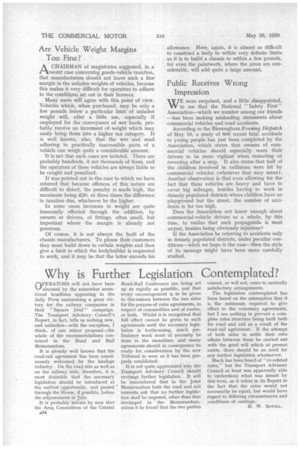Why is Further Legislation Contemplated?
Page 26

If you've noticed an error in this article please click here to report it so we can fix it.
OPERATORS -will not have been alarmed by the somewhat sensational headlines appearing in the daily Press announcing a great victory for the railway companies in their " Square Deal" campaign. The Transport Advisory Council's Report, in fact, tells us nothing new, and embodies—with the exception, I think, of one minor proposal--the whole of the recommendations contained in the Road and Rail Memorandum.
It is already well known that the road-rail agreement has been unanimously welcomed by the haulage industry. On the road side as well as on the railway side, therefore, it is. most desirable that the necessary legislation should be introduced at the earliest opportunity, and passed • through the House, if possible, before the adjournment in July.
It is probably known by now that the Area Committees of the Central Road-Rail Conference are being set up as rapidly as possible, and that every encouragement is to be given to discussions between the two sides for the purpose of rates agreements, in respect of commodities and of routes, or both. Whilst it is recognized that full effect cannot be given to such agreements until the necessary legislation is forthcoming, much preliminary work must of necessity be done in the meantime, and many agreements should in consequence be ready for consideration by the new Tribunal so soon as it has been properly established.
• It is not quite appreciated why the Transport Advisory Council should envisage further legislation. It will be remembered that in the Joint Memorandum both the road and rail interests ask that no further legislaL tion shall be imposed, other than that envisaged in the Memorandum, unless it be found that the two parties cannot, or will not, come to mutually satisfactory arrangements.
The legislation contemplated has been based on the assumption that it is the minimum required to give effect to the voluntary agreements, but I see nothing to prevent a complete rates structure being built both for road and rail as a result of the road-rail agreement. If the attempt of both sides to settle their own affairs between them be carried out with the good will which at present exists, there should be no need for any further legislation whatsoever.
Much has been heard of "co-related rates," but the Transport Advisory Council at least was apparently able to understand what was meant by this term, as it refers in its Report to the fact that the rates would not necessarily be equal, but would have regard to differing circumstances and conditions of carriage.
R. VV. SEwfu..




















































































